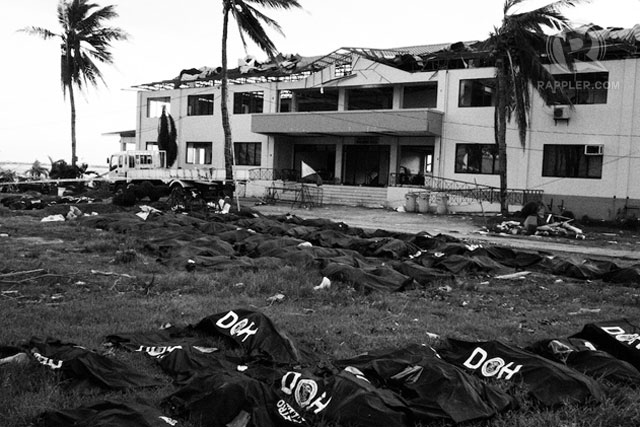SUMMARY
This is AI generated summarization, which may have errors. For context, always refer to the full article.

MANILA, Philippines – Super Typhoon Yolanda (Haiyan) is not just a wake-up call for the Philippines but also a global “turning point” for disaster risk management.
The United Nations said Haiyan is on a par with the 2004 Indian Ocean tsunami, and will “have a major impact on the discussions now underway on a new global framework for disaster risk reduction.”
In a statement, the head of the UN Office for Disaster Risk Reduction Margareta Wahlström said while the Philippines bore the brunt of “this extreme weather event,” other coastal areas especially in Asia could experience similar calamities.
“It is clear that the world is in unchartered territory when it comes to disaster events like Typhoon Haiyan and there is a need for a dramatic scaling up of our efforts to protect vulnerable populations and exposed assets from the threat of natural hazards,” Wahlström said.
Wahlström said Haiyan underscores that more work is needed to reduce the loss of life from extreme climate events.
“Typhoon Haiyan is a major setback for those of us who thought that the world was becoming more successful in reducing loss of life from major weather events,” she said.
“There is an urgent need to revisit the links between disasters and poverty. It is clear that education, early warnings, urban planning and building codes are key issues for renewed consideration in a world where all bets are off in terms of disaster impacts.”
Wahlström echoed scientists and disaster experts in saying that climate change will lead to more unpredictable and unprecedented weather events “where storm surges, violent winds and heavy rains will combine to undermine development efforts.”
“This is a tragedy on a par with the Indian Ocean tsunami of 2004 which led to a revolution in official attitudes towards disaster risk and paved the way for agreement on the world’s first-ever global framework for disaster risk reduction, the Hyogo Framework for Action which is about to be replaced.”
She added, “The greatest honor we can pay to those who have lost their lives and their homes in this tragedy is to ensure that everything possible is done to address the underlying risk factors which resulted in such huge loss of life.”
The world’s strongest typhoon to make landfall ever, Haiyan killed over 2,000 people with more feared dead. It devastated the central Philippines, flattening entire cities and towns, affecting 9.8 million people, and leaving many wounded, homeless, hungry and desperate.
Climate change and politics
Wahlström’s statements come as the United Nations meets in Warsaw, Poland, for the 19th Conference of Parties to the UN Framework Convention on Climate Change conference. Philippine Climate Change Commissioner Yeb Saño made a passionate appeal for action, and is fasting until a “meaningful outcome” is reached.
In a Thought Leaders piece for Rappler, Ateneo School of Government Dean Tony La Viña and Purple Romero wrote about the difficulties of getting developed countries to agree to legally-binding mitigation targets.
“One of the biggest challenges in making climate change negotiations effective is creating a stronger connection between science and policy. The certainty that science offers about the causes and impacts of climate change has yet to be fully enmeshed in the language of politics and priorities of governments, which have the responsibility of making sure the public is prepared for, and protected from, the effects of climate change.”
In an interview with CNN’s Christiane Amanpour, Philippine President Benigno Aquino III weighed in on the UN climate change talks and called for a solution.
“I think it is already an accepted reality for the Filipino community that global climate change is a reality, and that there should be no debate that this is happening,” he said.
“We all live in one planet; either we come up with a solution that everybody adheres to, operates with, or let us be prepared to meet disasters, ever increasing disasters at a global level,” Aquino said.
He said developed countries that are the biggest contributors to global warming must do their share to help developing nations who bear the brunt of their actions.
“Especially to the most developed countries that are contributing immensely to global warming, there has to be a sense of moral responsibility that what they wreak is playing havoc on the lives of so many others incapable of defending themselves,” he said.
Disaster experts have also called on Aquino and his government to make disaster risk reduction a priority, and integrate science, climate change and long-term planning into policy-making. – Rappler.com
Add a comment
How does this make you feel?
There are no comments yet. Add your comment to start the conversation.